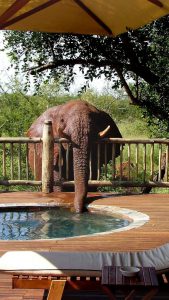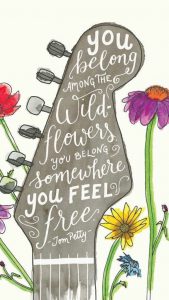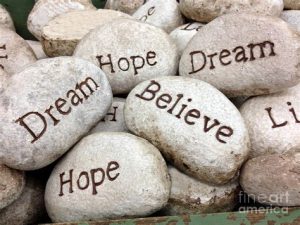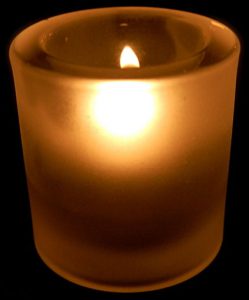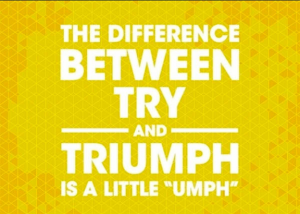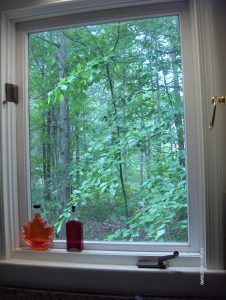Early in the week it was dark, cold, and blustery around here, with the temperature far below normal for the middle of May. It felt like winter had decided that it was never going to yield to spring. I didn’t even feel like going outside to get the mail and newspaper. The thought of planting annual flowers left me totally unenthusiastic. I was having a tough time picturing a good future, in general.
Given the lack of real-life places where I could go to cheer myself up, I decided that an imaginary visit with Fannie, my 119-year-old future self, would be the next best thing. I found her standing in the garage of her townhouse, next to her flying car. She wore blue jeans with a bright pink blouse, and she had shimmering pink hair to match.
The garage door was open. A warm spring breeze blew in, carrying the fragrance of flowering trees and shrubs. Fannie gave me a friendly smile and said, “Well, hello there! I was just on my way out to pick strawberries at a nearby farm. You look like you could use some more time in the fresh air, too. Hop in the car, and we’ll be off!”
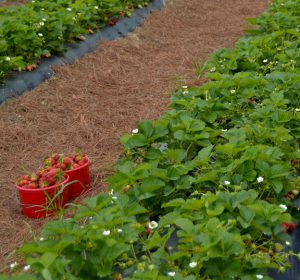
(Photo credit: Donald Lee Pardue)
Picking berries on a sunny spring day sounded like the perfect way to put the winter blues to rest. And a ride in the flying car, too—what could be better? I walked around to the passenger side, got in, and started looking for a seatbelt.
“It retracts completely when the car is off, and then it automatically dangles in front of you when the car is turned on again,” Fannie explained. “That design is an improvement on those annoying automatic seatbelts that nobody ever wanted to buy. Hildegarde, set destination: Wildland Historical Farm.”
Lights blinked on all over the dashboard, motors whirred softly, and the seatbelts made their appearance as Fannie had described. “Destination set,” a female voice replied, with an accent somewhere between Midwestern and Scandinavian.
“Hildegarde?” I asked, buckling myself in.
Another light came on as I spoke. Evidently, by saying its name, I had put the car into a mode to process further spoken input. “Proceed to destination,” Fannie said cheerfully, and the car started backing itself out of the garage.
“The car needed a name,” Fannie continued, now speaking to me, “and I thought it was a good fit. Definitely better than all those nameless cars you had over the years, which you referred to as ‘the white car’ or something equally dull. I may be a future version of you, but that doesn’t mean I can’t improve on your more boring habits.”
“Okay, that’s fine, I didn’t mean to criticize the name,” I said with a shrug, not at all inclined to argue when there were a lot more interesting things to do. The car steered itself onto a concrete takeoff lane in the center of the townhouse complex, lined on both sides with blooming purple wisteria. It accelerated quickly and launched itself into the air.
I gawked like a tourist—which I supposed I was—as we soared above tall buildings with flourishing roof plantings. Some also had vertical greenery along the walls. Bright-winged birds swarmed everywhere, almost as if we had been flying over a jungle instead of a bustling metropolis. At first I expected some birds would come smashing into Hildegarde’s windshield, but they all stayed at a safe distance.
“Today’s cars have effective bird-avoidance technology,” Fannie commented, as I turned my head to watch a yellow-winged flock veering away. “They’re designed with features that make them look and sound like raptors on the hunt to any nearby birds. Collisions with wildlife are rare.”
We had reached the edge of the city by now, and the buildings rather abruptly gave way to a mix of woodland and blooming wildflower meadows. This landscape, although pretty, left me with a strange sense of disorientation. Where were the roads, the farms, the small towns? Had there been some sort of natural disaster?
“Where are we?” I summed up my confusion in a simple question.
“America the Beautiful, minus the amber waves of grain,” Fannie informed me. “Almost all food nowadays is factory-grown in vats. It’s much more cost-effective than traditional farming, and safer too—we don’t have to worry about parasites, pesticides, foodborne illnesses, pollution from fertilizer runoff, or pandemics caused by viruses from livestock. Also, the nutritional content is standardized, so we have more awareness of what we’re eating.”
A herd of brown cattle, apparently feral, went thundering by as we flew over another meadow. Huge clouds of butterflies, disturbed by their passage, rose up from the flowers.
“Approaching destination, prepare for descent,” Hildegarde announced.
At first I couldn’t imagine where we might be going, in such a wild landscape. Then a tidy parcel of cultivated land came into view beyond the next hill, with a road on the far side leading to a highway in the distance. Trucks, which surely had to be automated, streamed by on the highway at a steady pace, with an occasional small car or motorcycle among them.
“People are healthier now and living much longer,” Fannie went on, “and some of our new foods don’t seem much different from what they replaced. For instance, I can’t tell tuna made at a factory from the real thing. Still, humans evolved as hunter-gatherers and then spent many millennia as farmers—so there’s an instinctive sense of loss, I believe, that comes from having our food supply so disconnected from anything we do in nature. That’s why I like to get out and pick my own fruit or veggies every once in a while.”
Touching down smoothly in a lane along the edge of the farm’s parking lot, Hildegarde retracted her wings and pulled into a nearby space between two similar vehicles. On the other side of the lot, an ordinary-looking, non-flying school bus had just turned in from the access road.
Fannie and I walked into the strawberry enclosure. A young woman greeted us cheerfully and gave us each a basket. Two robotic folding chairs promptly detached themselves from their nearby charging stations and started rolling along behind us while we looked for a good place to pick.
“How about here?” Fannie stopped next to some tasty-looking berries. The chairs stopped also, and she pushed buttons on one of them to adjust its position and height. I did the same with the other, and we both sat down. Just then, a group of chattering preteens and their teacher walked in from the parking lot, and Fannie smiled.
“I always like to see the children,” Fannie told me. “They’re our link to a good future—however different that future may look.”
Putting berries in my basket, I found myself smiling too. Maybe this hadn’t been quite what I imagined a strawberry-picking trip would look like, but it certainly had put me in a better mood.

